Unicorn HR leader, Saumya Khare, talks about hiring trends and careers opportunities with startups
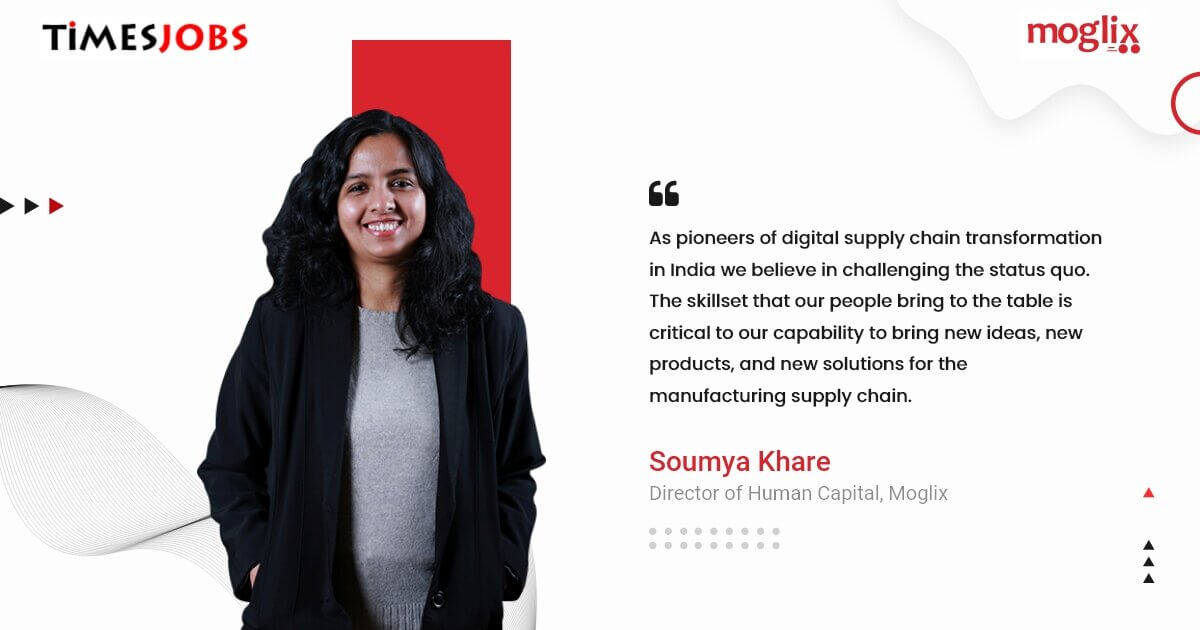
Unicorn HR leader, Saumya Khare, talks about hiring trends and careers opportunities with startups
Moglix is a technology-first company. The technology industry respects innovation and innovation at scale mandates skill over and above experience. As pioneers of digital supply chain transformation in India, we believe in challenging the status quo, conducting controlled experiments to explore new solutions that did not exist before. The skill set that our people bring to the table is critical to our capabilities to bring new ideas, new products, and new solutions for the manufacturing supply chain.
Startups have been at the forefront of the new economy, creating tremendous value, creating some of the most amazingly useful and efficient solutions that have saved lives and livelihood of people. Starting your career at a start-up is an accelerator.
While answering to the audience Saumya said
“To understand if a startup will scale up or not, you will have to go beyond the cosmetics and understand the business model. That will help you make an informed choice. All founders want their startups to scale and that is why they are passionate about building it from ground level. Ultimately, you need to judge if you are convinced about the business model & potential and it is aligned with your skill sets”
In the technology industry, new waves of innovation continuously shape the dynamics of who stands where.
To summarize she said “startups offer fantastic opportunities for learning, empowerment while working, opportunities to work in different segments of interest and a very fast paced environment where you can see the direct impact of your work, & are just not a cog in the wheel”
Moglix CEO Rahul Garg talks about Credlix`s growth plans, new acquisition
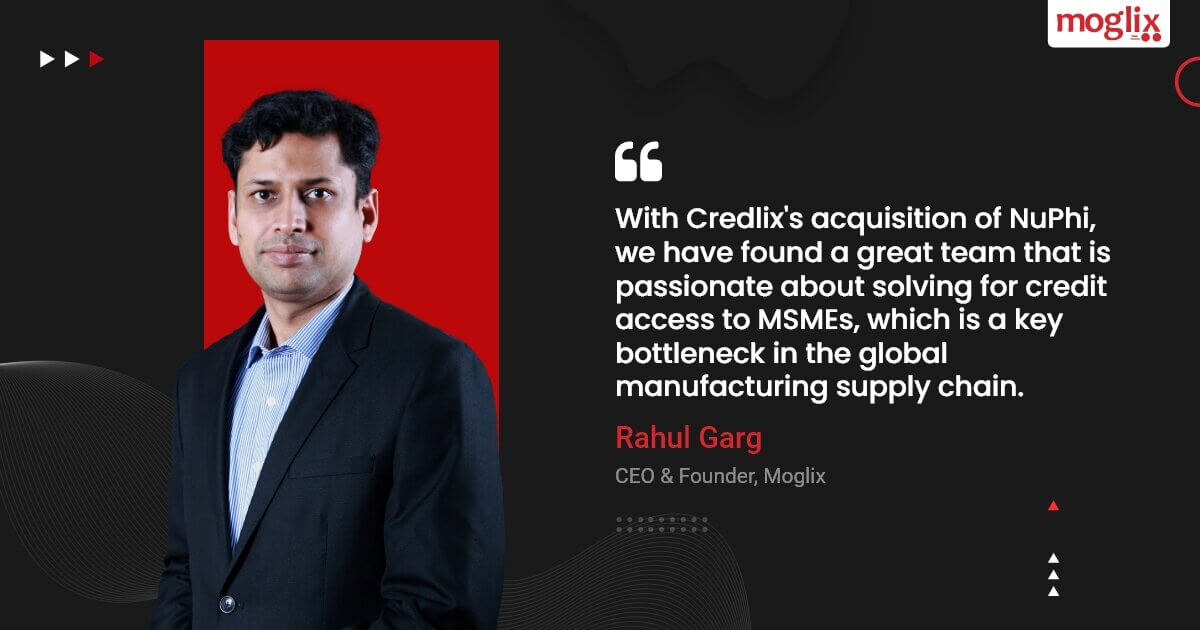
Moglix CEO Rahul Garg talks about Credlix`s growth plans, new acquisition
Credlix, the digital supply chain financing platform from Moglix, has entered the EXIM financing space, with its acquisition of NuPhi. The acquisition comes shortly after Moglix’s entry into the Middle East region. As Moglix continues to expand globally, it is focusing on strengthening its supply chain financing solutions to enable manufacturers easy access to cash flow for their growth.
NuPhi is a Singapore based fintech start-up offering invoice factoring solutions to MSME exporters in India and SouthEast Asia. Founded in 2019, by Pramit Joshi and Mayur Totla, NuPhi offers cross border financing and SaaS applications to digitalize and automate EXIM workflows.
Elaborating on the decision to enter EXIM financing through the acquisition of NuPhi, CEO & Founder, Moglix, Rahul Garg said “As we continue to grow across verticals and geographies, we are building a single operating system for B2B commerce in the manufacturing sector. We are simplifying the flow of goods and value through our global supply chain to improve the ease of doing business. In NuPhi we have found a great team that is passionate about solving for credit access to MSMEs that is a key bottleneck in the global manufacturing supply chain.”
Moglix is set to transform the Packaging Industry in India
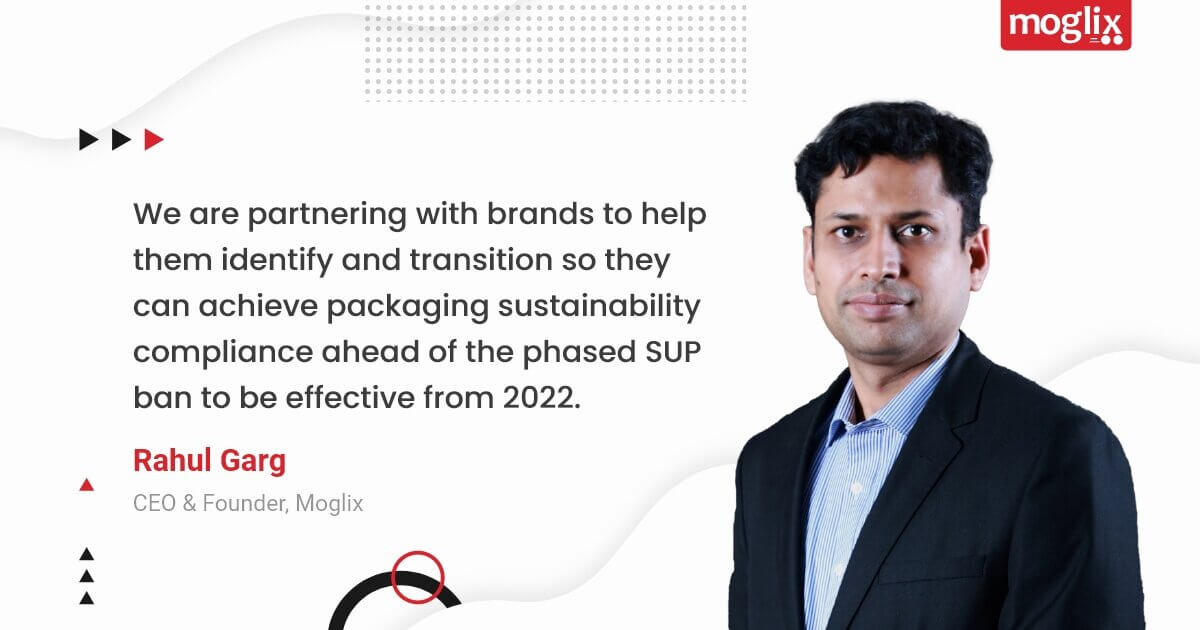
Moglix is set to transform the Packaging Industry in India
Rahul Garg, CEO & Founder, Moglix says ‘We are set to transform packaging industry in India’ and talks about how Moglix has become India’s largest cost-effective packaging solutions provider. Moglix is enabling brands to adopt end-to-end sustainable packaging solutions. We are partnering with brands to help them identify and transition so they can achieve packaging sustainability compliance ahead of the phased SUP ban to be effective from 2022.
Our packaging vertical is meeting the packaging needs for more than 70% of e-commerce orders in the country. We are giving source-to-site packaging supply chain solutions to large manufacturers across industries to resolve their challenges of limited shelf life of perishables, pilferage, spoilage, and wear and tear during transit journeys for domestic and global trade. Moglix is also focusing on Food & Beverages, Textiles, Cosmetics and Personal Care, Pharmaceuticals and Healthcare, Automotive Packaging solutions.
As a brand, the packaging for your product is a manifestation of all the effort gone into your product. As a user, the moment you see the packaging, you are assured of the safety and quality of the product. That is why packaging holds a special place for businesses.
Rahul, says
Moglix is a one-stop solutions provider for packaging needs. Our products go through 3 levels of quality check and comply with government regulations. We are reducing the costs of compliance with the amendments to the Plastic Waste Management Rules, 2021 that will come into effect from July 01, 2022, and enabling large enterprises to hit the ground running with agility. Through our supplier capability mapping process, we are continuously expanding our pan-India packaging supplier base, thereby reducing the costs of supplier search and product development for sustainable packaging solutions.
The ET Cutting Chai Stories in conversation with Sandeep Goel
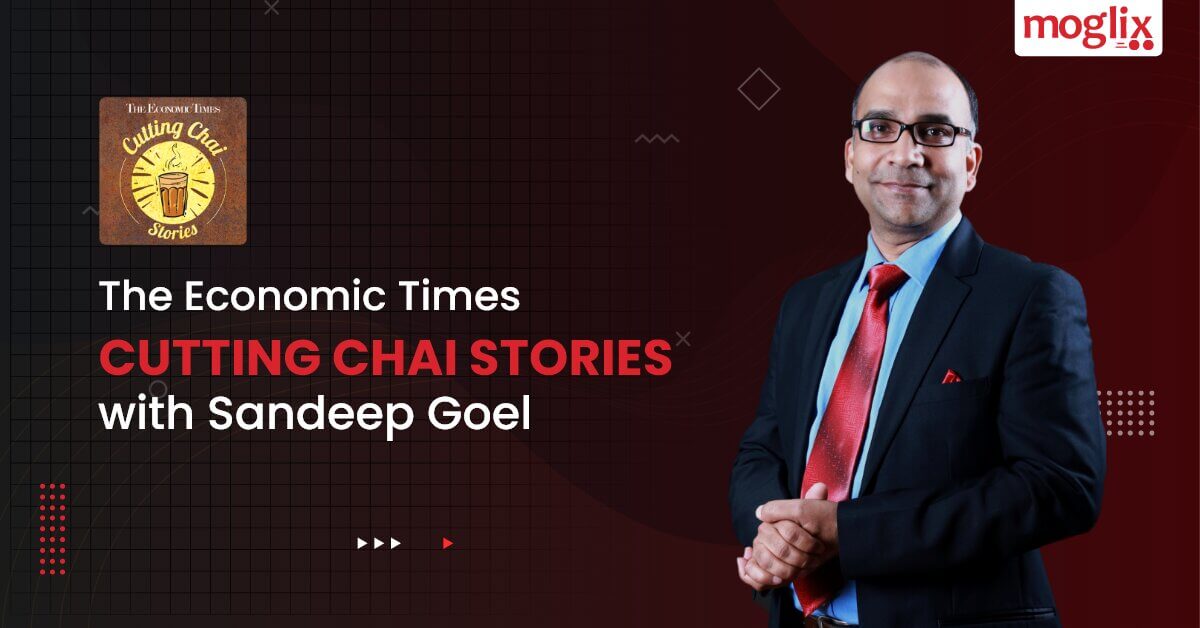
The ET Cutting Chai Stories in conversation with Sandeep Goel
Catch Sandeep Goel, Senior Vice President, Strategy & Operations, Moglix in the recent episode of ET Cutting Chai Stories with Ashwani Mishra, Consulting Technology Editor.
In this interesting conversation, Sandeep very humbly talks about his childhood experiences, learnings and defining moments of his career that shaped him into the optimistic leader that he is today, “looking at the glass half-full glass and not the empty part”.
Connectivity, Convenience, and Analytics: Digital Supply Chain Transformation in Action
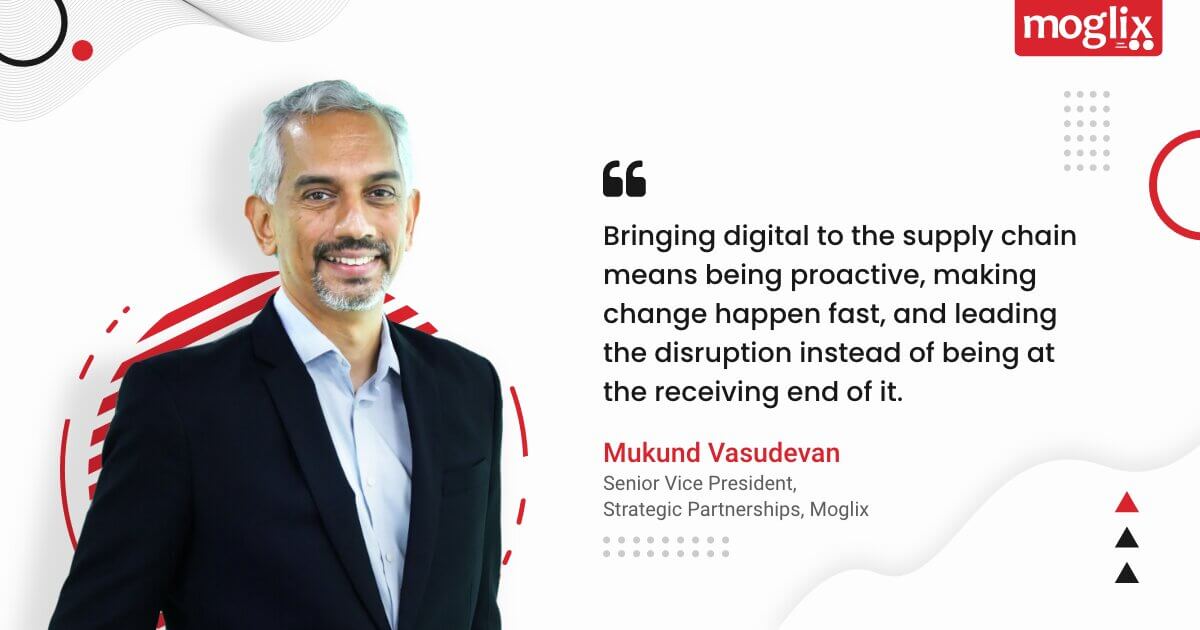
Connectivity, Convenience, and Analytics: Digital Supply Chain Transformation in Action
Prior to the COVID19 pandemic, manufacturing enterprises in India often relied on a highly fragmented supplier base. With few exceptions, replacing hundreds of vendors with a few strategic ones was not common. Procurement teams often made multiple small value purchases. Often, and perhaps by design each supplier got a small piece of the procurement pie, depriving them of opportunities to scale up. No supplier had the incentive to think beyond the purchase order at hand and invest in best practices, process improvements, systems and customer-dedicated investments.
Communication with suppliers was done largely through paper records, emails, and spreadsheets. While many firms used ERP systems, few suppliers were integrated seamlessly with those ERPs.
The pandemic severely tested this inefficient system. Overnight, suppliers were shut either due to regulation or due to shortage of manpower. Communication channels broke down. Working capital was a challenge. Order tracking and visibility was non-existent. Finding alternate suppliers was a slow and arduous process. In short, the supposedly solid supplier ecosystem, wasn’t quite what it was made out to be.
Read MoreEncouraging women’s role among MSMEs can lead to sustainable growth
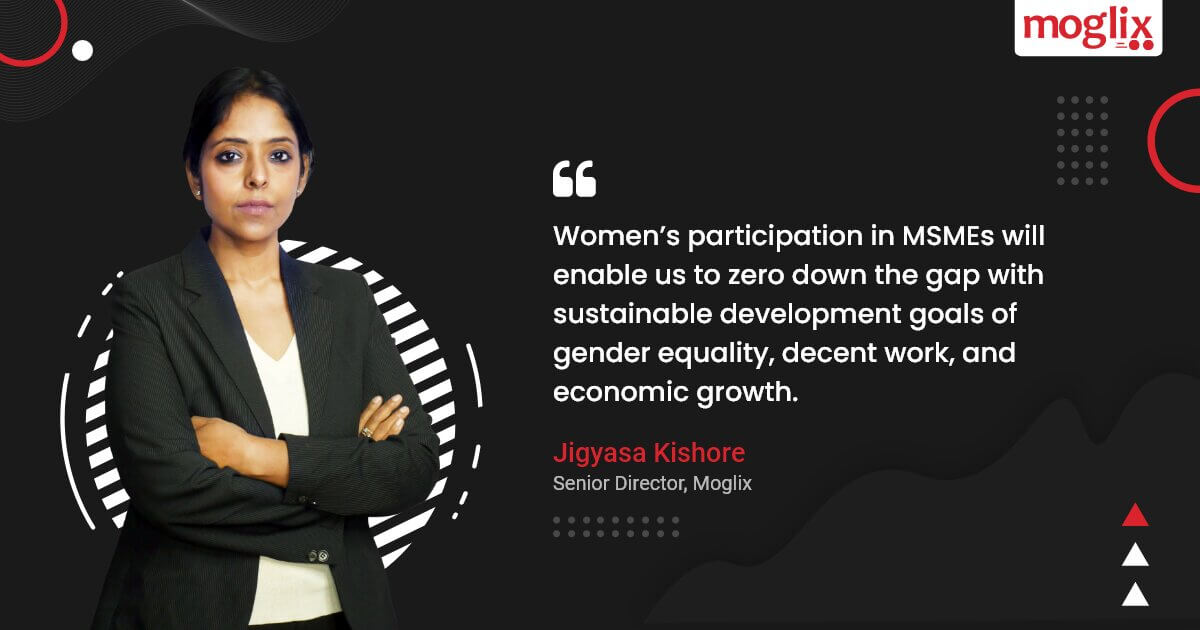
Encouraging women’s role among MSMEs can lead to sustainable growth
Building back better for women means challenging the status quo of women’s participation in the economy. Women constitute 48% of the population but form only 21% of the workforce. For the MSME sector, it means raising the bar above its current contribution of 30% of the GDP.
Impact of the Pandemic on the MSME Sector and Women
Last year at the height of the first wave 43% of the MSME sector, that is 75 Million MSMEs were faced with the risk of closure. The threat to the MSME sector implied that 33% of India’s manufactured output and the job opportunities for a substantial proportion of 120 million people were at risk.
Women’s participation in the economy is one of the quickest ways of empowerment and sustainable growth. The pandemic has negatively impacted 73% of women entrepreneurs, and 20% had their revenue nearly wiped out. Another 35% of the women entrepreneurs experienced a decline of 25%–75% in revenue.
Women Can Turn Around the fortunes of the MSME Sector
● Connect Womens’ Entrepreneurial Spirit to Market Access
● Enable Digital Empowerment of Women
● Connect Women Entrepreneurs to Digital Credit Platforms
If 50% of women join India’s workforce, the Indian economy can add up to 9 percentage points to the real GDP growth rate.
Moglix is on its way to build smarter and faster procurement and logistics solutions
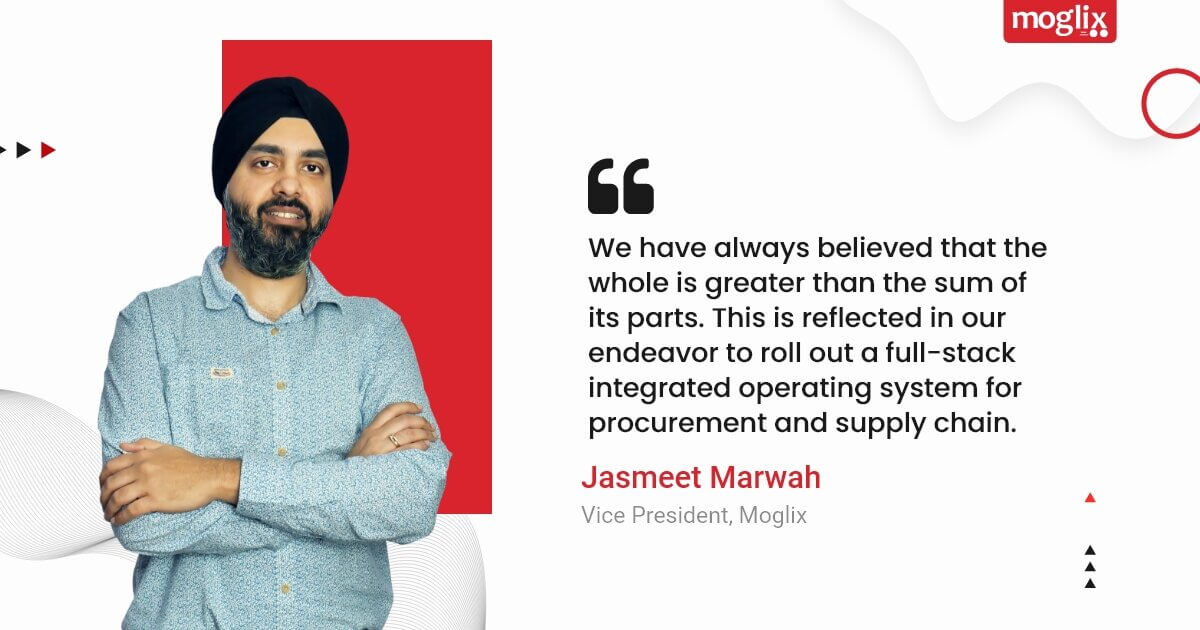
Moglix is on its way to build smarter and faster procurement and logistics solutions
Moglix is a digital solutions enterprise with an obsession for customer service. The excellence of our supply chain operations defines who we are and what we do to meet our customers’ requirements. Furthermore, I believe that leadership wins through superior logistics. Our success in the B2B commerce space is rooted in our ability to leverage technology to bring greater visibility and predictability to the supply chain journey for our customers.
We have always believed that the whole is greater than the sum of its parts. This is reflected in our endeavor to roll out a full-stack integrated operating system for procurement and supply chain.
Be it our Moglix Supplier Central application for procurement and supplier relationship management, our Moglix catalog for indirect procurement, the Moglix Buyer’s app for order management and real-time order tracking, or the warehouse and field management system for efficient logistics operations, users from our customer enterprises get to access all these modules or customized bundles from a single operating system.
Moglix’s technology has always been about unlocking new avenues of efficiency through the integration of suppliers, customers, and logistics. At Moglix, we are using technology to build smarter and faster procurement and logistics solutions for creating a great customer experience.
Magic’s got nothing on Moglix to procure industrial supplies in a hassle-free way

Magic’s got nothing on Moglix to procure industrial supplies in a hassle-free way
Moglix has launched an ad film as part of its ongoing #MoglixHaiNa (there is Moglix) campaign. The campaign is aimed at showcasing the burden faced by procurement managers in sourcing daily responsibilities.
Conceptualized by Bedlam Studios, the film looks to educate customers about the ease and convenience offered by Moglix through its e-commerce platform. The film is staged against the backdrop of a procurement talent hunt. The procurement manager Mishraji attends the hunt organized by his team and is introduced to a magician, who his team claims can procure any material through magic. In the middle of the act, the magician forgets the magic spell and still denies defeat. Meanwhile, Mishraji showcases the ease of buying on the Moglix app to get timely delivery and assured quality of the items required.
“We wanted to showcase the lives of procurement managers in a fun way, to bring the spotlight on procurement teams who are the backbone of the organization but not recognized or celebrated. The films try to bring to life the quirks of daily work life in a procurement department, a segment that has never before been addressed before.”
says Pallavi Chelluri, Director, Moglix
“India operated pretty much without catalogues pre-Moglix. We are ecstatic with the launch of the ‘Moglix Hai Na’ digital campaign which catapults Moglix as a brand that is building the catalogue for India. We are confident that this campaign will resonate with our brand’s philosophy and further strengthen our position as India ka catalog across India.”
says Jigyasa Kishore, Senior Director, Moglix.
The campaign is rolled out on digital and OTT platforms.
Enabling low-cost innovation and value creation in procurement
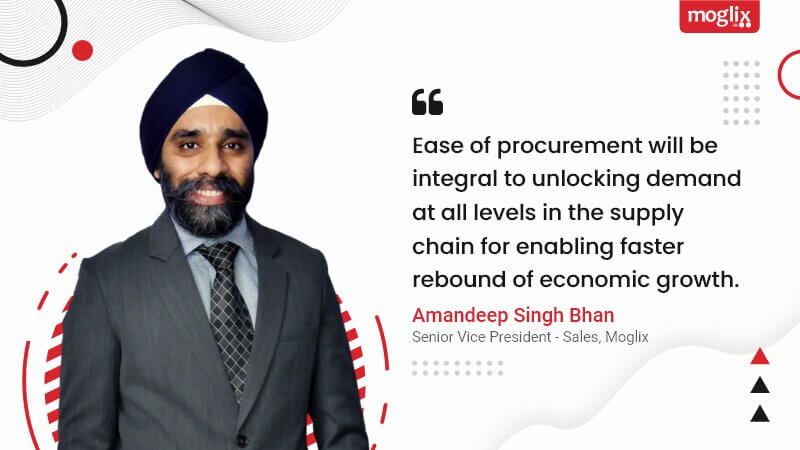
Enabling low-cost innovation and value creation in procurement
Procurement organisations in India will have to assume a much bigger role in value engineering in a post-pandemic world. Any consignment remains stationary for 80 percent of the time in the supply chain journey.
When a consignment remains motionless, it appears not in the market where the end customer is waiting to access it, but in different warehouses and data management systems. This is the biggest supply chain paradox. This is the Keynesian “unintended accumulation of inventories” that has negative consequences on cash flow, cash conversion cycles, and inflation of warehousing real estate rentals and logistics. It also results in wastage of utility and lost sales opportunities.
Ease of doing business through the lens of procurement agility in the supply chain
One of the chief reasons behind this inertia is to be found in the digital divide facing procurement. Typically procurement organisations that operate with offline processes take anywhere between two to three hours to complete a procurement transaction, whereas those that operate with digital procurement platforms take three to five minutes.
Coming out of the pandemic, procurement organisations in India will have to assume a much bigger role in value engineering than being caught up in routine tasks. These include collaboration across the end-to-end value chain; enabling low-cost innovation; and ensuring faster completion of industrial projects.
Enabling low-cost innovation by sourcing mission-critical components
Procurement organisations will have to leverage sourcing of components and sub-assemblies to make low-cost innovation a reality. The rollout of low-cost innovative goods has the potential to invite the interest of large OEMs to make in India for the rest of the world. A great example of such affordable innovation is the low-cost air ventilator recently developed by the IIT Kanpur consortium; a life-saving product for patients in the face of Covid-19.
The future of supply chain and procurement in India
Procurement systems create a favourable feedback loop that percolates to the downstream supply chain by enabling faster go-to-market. Ease of procurement will be integral to unlocking demand at all levels in the supply chain for enabling faster rebound of economic growth.
AI and ML accelerating the growth trajectory at Moglix
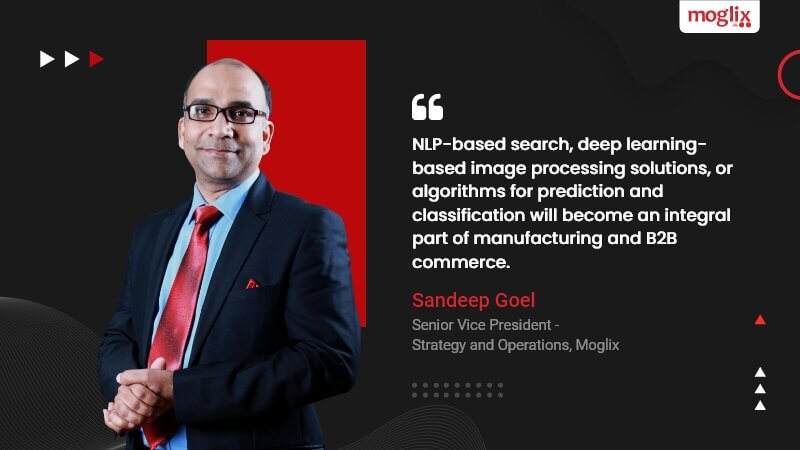
AI and ML accelerating the growth trajectory at Moglix
In an exclusive interview with Analytics India Magazine, Sandeep Goel, Senior Vice President, Strategy and Operations, Moglix, shares his insights and experience in the tech industry.
“Today, every organization is developing solutions specific to their needs. Still, portable models will become available over a period where models developed by one organization will be easily reusable by others, bringing speed to the deployment of AI/ML solutions,”
says Sandeep Goel
By leveraging artificial intelligence and machine learning algorithms, Moglix has been able to achieve major objectives such as clean data, accurate search results, data-driven decision making, cost optimization, 4X better efficiency, and better governance.
“At Moglix, our focus is on building products and solutions for our internal consumption and customers. Our experience in supply chain digitization, master data management, data mining, and procurement analytics is the core of our business,”
says Sandeep
Some of the programming languages used predominantly by our data science/analytics team are Java, Scala, PHP, Python, Angular.
Our tool stack includes Scikit, SpaCy, RabbitMQ, Cassandra, Mongo, ElasticSearch, and Apache. Other libraries include Pandas, Numpy, FBProphet, NLTK, SciPy, PDFminer, Pytesseract, APScheduler. For database management, we use an SQL server. Also, we use Matplotlib, Seaborn, Plotly for visualization, and GitHub for tracking.
